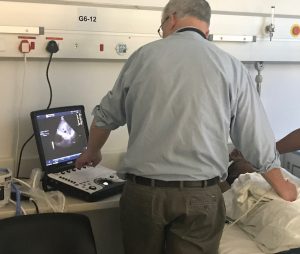
It’s fair to say that, given the option or having the resources to check themselves in, most South Africans may prefer being admitted for treatment in a private hospital rather than a State facility.
In the 50th anniversary of South Africa achieving the first human-to-human heart transplant, public sector cardiac services appear to have lost ground to private hospitals and specialists.
But cardiologists in the public sector disagree – and many patients back them.
“There’s this weird dichotomy of saying public health service is terrible, private is fantastic. It’s a complete falsehood,” says director of the cardiac catherization laboratory (cathlab) at Red Cross War Memorial Children’s Hospital, Associate Professor Rik de Decker.
“Everyone who is trained to do specialised healthcare is trained in the public sector. All training, firstly as a doctor and then specialist and sub-specialist training, happens in a public sector, academic hospital, the majority of research happens in academic hospitals.
“We can do things here that they can’t do in private.
“If I get a call here in Cape Town, they say they have a baby, we can go and do a procedure anywhere (in the Western Cape province). We get the air emergency services and we bring the baby back here. You cannot do that in private practice, it’s just not possible.
“Yes the public healthcare system is in terrible trouble, but the services you can get are better in some respects and cost-free if that patient can’t pay. The private guys can’t do that.
“There is massive potential for public health services to do much better. There are certain areas of public health services that far outstrip the way they do things in private. What we see and hear is that private practitioners are in silos and competitive, they have to compete for patients.
“The spirit here is the best for the children. There is no competition for money. Our workload is massive. There is no lack of work and the resources we use are what the patients need. I don’t have to worry that I’m spending too much money on a patient if I can justify that the patient needs that service.”
De Decker says that a team approach is the best way to treat children with congenital heart disease (CHD). Some of his unit’s patients enthuse about these successes.
Noxolo Ntshintshi’s daughter, Unakho, has been treated in both private and public sector hospitals in East London and Cape town. She says there is not much difference in the quality of healthcare; the individual skill and experience, as well as the commitment, of private sector doctors is unquestionable.
But, the team-oriented approach in State hospitals is far-and-away the best.
“Even during hospital rounds, it’s a team. Your child is the centre of attention. They go away, discuss, and come up with a plan.
“In the private hospital, your child is seen by one doctor and you must make bookings well in advance to see that doctor. Only that one doctor makes decisions regarding your child. When you have a child with a complex condition, you need someone who is accountable (to a team or a supervisor).”
There is no difference in the quality of care, she says. “Maybe there are long waiting times (in the public sector) but the doctors deliver.”
Many parents attending cardiac clinics with their children at Frere and Cecilia Makiwane Hospitals were enthusiastic about the level of care in the public sector facilities.
You must log in to post a comment.